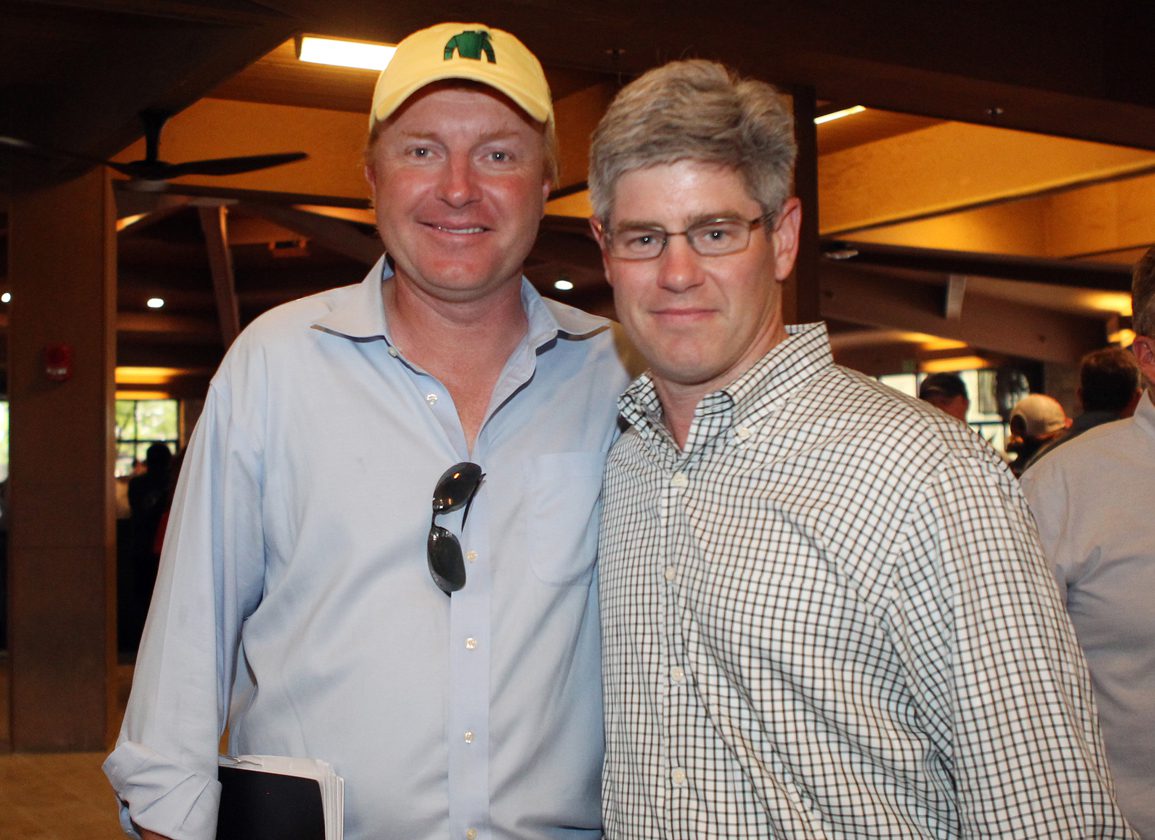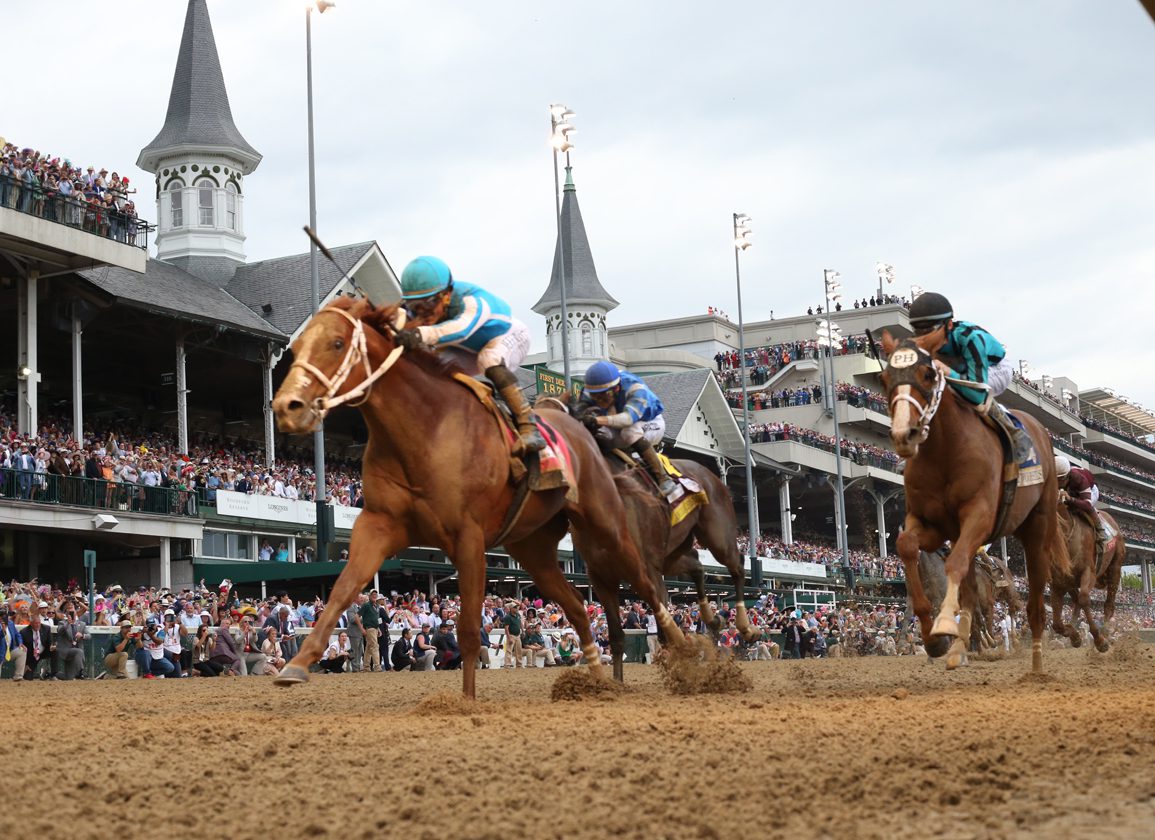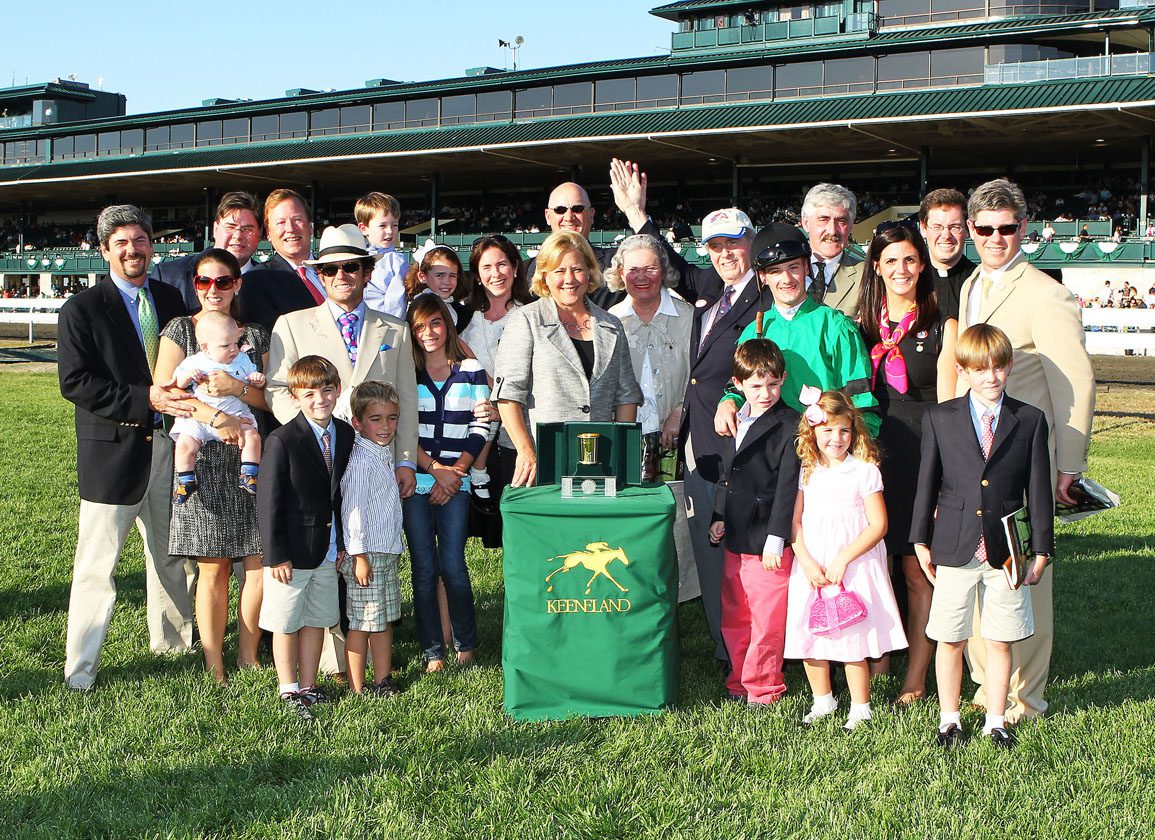Who knows what kind of Turf, never mind what kind of world, may be inherited by such of his 15 grandchildren as may themselves be blessed to reach the landmark they celebrate with Catesby W. Clay on Tuesday? But someday they will look back on the apt emergence, in his 100th year, of a fourth Kentucky Derby winner raised on the farm founded by his own grandfather, and see that the heritage of the race itself gained at least as much from Runnymede, in 2023, as the other way round.
For consider him well, kids: this man before you is just a fifth link in the chain to one who knew Daniel Boone. Before founding Runnymede in 1867, Catesby's grandfather Colonel Ezekiel Clay lost an eye in the Civil War; and he was a grandson of Gen. Green Clay, a revolutionary soldier and frontiersman who came through Fort Boonesborough to Madison County as a surveyor. The history of this family is a prism for the history of Kentucky; and much the same might be said of Runnymede, as a bedrock of the evolving American Thoroughbred.
It says everything that Catesby, back in 2009, should have been the 78th Honor Guest of the Thoroughbred Club of America, when his stepfather Senator Johnson N. Camden had been favored as its fifth. Catesby was then already 87, and has understandably slowed down since. But he will be left in no doubt as to the warmth and reverence of the family convening at Kentucky's oldest continuously operative horse farm, a century after his birth on 25 July, 1923.
“Even in his later years, he has always remained an example to us,” says his son Brutus. “Because his faith, his love for his wife and his family, is so evident down to his very core. The kindness that he exhibits to everyone, and the gratitude that he has for his caregivers, just permeates everything that he does.
“We're blessed to have him around. He doesn't quite have the quick wit for which he was always known, but he's still able to appreciate situations. And he has always cared so deeply. I was always amazed that for all those years he was really working two jobs: a day job at Kentucky River [a land and coal corporation], and then he would stay up late, working on the matings, thinking about how to keep the farm going. It was truly a labor of love.”
Brutus is too modest to note that he similarly divides his role as Runnymede Chairman and CEO with several “day jobs” of his own, instead stressing the importance of farm President Romain Malhouitre as this venerable farm has adapted to a changing commercial environment. Its success, in making this adjustment, was marked in memorable fashion when Mage (Good Magic)–foaled, raised and prepped here on behalf of clients Grandview Equine–won at Churchill in May.
“Without Romain, we wouldn't be sitting here talking,” Brutus says. “He's been with us about 10 years now. It was a time of transition, and we needed to find someone with the capacity to bring all the pieces together. With Pops, this was a private farm, with the exception of Peter Callahan who's been with us over 35 years; and just a few others along the way. You couldn't ask for a better partner, he and his daughters have been just extraordinary. But otherwise we didn't have many other clients.”
The 2009 recession changed all that. “My father looked at me and said, 'You need to figure out a way to make this more sustainable,'” Brutus recalls. “He had never given much consideration to the financial constraints, treated it more like a hobby-and, consequently, bred a lot of really good horses! So we're really working to make the farm a sustainable operation: Romain has been absolutely instrumental in that, and we now have over 40 different clients. We feel very blessed, but I like to think it has to do with us being pretty good partners, too.”
Mage, then, sets a fairly symbolic seal on that evolution. Aptly, Grandview came to Runnymede through another set of Clays-Robert, his son Case and partners-albeit the presumed kinship is by now a distant one.
“To have them as clients is such a privilege,” Brutus says. “Robert came to us four or five years ago, looking for somewhere to keep his mares. Grandview was about stallion shares, and buying some good mares to support those stallions. And we were really honored that he felt Runnymede was a good place to board those mares.
“So Puca (Big Brown) was among them. Everything that she's thrown has been able to run, and from what I understand her second Good Magic, the 2-year-old, is showing a lot of promise.”
Mage's brother, named Dornoch, was acquired by Oracle Bloodstock from Runnymede's consignment at Keeneland last September for $325,000. At that stage, of course, Mage remained unraced, so it has already been quite a ride for Dornoch's owners Randy Hill, West Paces Racing and former baseball star Jayson Werth-and Danny Gargan recently disclosed to Daily Racing Form that Dornoch is “the best horse I ever trained.”
Puca's next offering, a colt by McKinzie, will not be passing under too many radars this September, then.
“He's a nice, well-proportioned, athletic mover,” Brutus says. “Up to this point everything Puca has produced, has performed. They've all been different, physically, but they all like to run. And the McKinzie really looks the part.”
If Derby day completed a turn of the wheel for his native farm, in another respect the experience brought things full circle for Brutus. For one of the turning points in his own journey with Thoroughbreds, having gone away to get his MBA and start out in business, was the success of a filly named Meribel (Peaks And Valleys)-co-bred by his father with Arthur Hancock-in a graded stakes at Keeneland in 2006.
“Up until then I had always thought owning a racehorse was stupid, because on average you lose money,” he remarks. “I was like, 'That's not a good bet.' But that became one of those indelible memories that made me realize their value. The whole family's there, grandchildren, there were 16 of us packed into the box, and she comes round the whole field, we're all screaming as she makes this late run, ends up winning by a half. And afterwards my father looks at me, and I see tears coming down his cheeks, this look of disbelief, his mouth gaping.
“So anyway, Mage comes running down the stretch and I have that exact, same stupid look. My mouth is wide open. And I'm like, 'Is this happening?' It's funny, because you think of the genetic imprint for horses, and then how it works out in us, too.”
Fitting sentiments, those, in one of eight siblings who share a grateful sense of the remarkable dynasty they extend. The pioneering Green Clay came out of Virginia in the early 1780s, before there was any such thing as the Commonwealth of Kentucky.
“And the folklore has it that the fee for surveying was 40 percent of whatever was surveyed,” Brutus explains. “So he would pay someone to travel to the local courthouse, to file the claims. But do you know where the local courthouse was? Richmond. That's Richmond, Virginia, not Richmond, Kentucky! Anyway he obviously amassed considerable holdings. He had over 40,000 acres, he had taverns, toll roads, distilleries, and Clay's Ferry on the Madison and Fayette County line.”
Nearly 250 years on, of course, the world is a different place. Brutus is someone who reflects sensitively on the past, and how his family came by its affluence. He knows that the planters of that era owned many slaves; and, more recently, that the Clays have mined a lot of coal. But he is in tune with his own times, notably as a passionate entrepreneur in the growing of crops as a renewable source of energy. And he has also worked hard to engage the wider world with our community, for instance as a co-founder of Horse Country; and also through As One Racing, a partnership with a mission of diversity and inclusion.
“You look back at your ancestors, and you see what was done,” he says. “You can't really change that, but you're always thinking about how you can contribute in a meaningful way, going forward. There's this phrase, that families grow faster than businesses. In some respects, we've been privileged that my ancestors were first movers. But about each third generation has to reinvent. Otherwise, you don't continue.”
Green Clay had a son, Cassius Marcellus Clay, with whom Brutus likes to identify. (It was this same firebrand abolitionist that inspired the naming of a certain boxer who figures proudly in the history of African American Kentucky.)
“Cassius was a bit of a rabble-rouser,” Brutus explains. “He went to Yale, heard an abolitionist speak, and came to the conclusion that slavery was wrong. And there's a story of a rally and debate that took place at Mt. Brilliant Farm. Cassius went to share his views, which weren't particularly popular. Turns out that some of the local landowners had hired an assassin from New Orleans, who shot him at a point-blank range, three inches above his heart, with a single-shot pistol. Well, fortunately for Cassius, he carried his Bowie knife on his left side. And the sheath of the knife stopped the bullet. He then proceeds to pull out his knife, because he was offended, and nearly kills the guy.”
Sure enough, since the assassin was unarmed after discharging his one bullet, it was Cassius who was charged with attempted murder. Fortunately, he could hire no less eloquent a cousin than Henry Clay to secure his acquittal.
But it was not just communities, but families, that were riven by the slavery debate. Cassius had a brother, Brutus, whose son Ezekiel opposed their abolitionist views and acted accordingly when the Civil War began.
“His father promised to disown him if he joined the Confederacy,” says Brutus. “But being who he was, that's what Ezekiel did anyway. He rose to the rank of colonel, and fought a number of battles with a great deal of courage. He ended up losing an eye and being captured in the Battle of Paintsville, and spent some time up in Johnson's Island on Lake Erie.”
Yet just as division extended to many a family table, so did Reconstruction. His reconciled father either loaned or gave Ezekiel the funds to start Runnymede and, along with his brother-in-law Catesby Woodford at neighboring Raceland, “Zeke” did much to lay the foundations of the modern American Thoroughbred. Such epic careers as those of Ben Brush, Hanover and Miss Woodford began through their partnership.
“To me, it's a prodigal son kind of story,” Brutus remarks. “Over the 30 years or so that they were breeding horses, nine were leading sires, either standing or bred by Runnymede. They bred two Kentucky Derby winners, two consecutive Belmont winners, a Preakness winner. Four in the Hall of Fame. The litany of champions they had was pretty extraordinary.”
Incredible to reflect that “Zeke” died just three years-virtually to the day-before his heir (another Brutus) celebrated the birth of his son Catesby W. Clay. Sadly, it was not even three years later that Catesby lost his own father in a staircase fall. (To this day, a stair-gate at their elegant manor house reminds the family of that tragic night.) In time, however, his mother's remarriage introduced Catesby to a cherished mentor in both business and breeding. Senator Camden was chairman of Churchill Downs for many years, and Catesby would eventually serve 45 years on the board there himself.
“His stepfather was a real father to Pops,” Brutus says. “He was also one of the founders of the Kentucky River Coal Corporation, which was kind of that third generation change I mentioned. And, candidly, that was what carried the farm through the ups and downs you get in this business.”
Even so, the Depression required Senator Camden to disperse his own 1,500-acre Hartland Farm near Versailles, and relocate his diminished broodmare band to Runnymede. Catesby himself had gone away for his academic and business education and it was only after a third farm graduate won the Derby-Count Turf in 1951-that he began to engage with the challenges of breeding.
Meanwhile he did a fair bit of that himself, raising eight children with his wife Biz (nee Elizabeth Gerwin). These include Father Chris Clay, who was once a turf writer but discovered a more salubrious purpose in life and now tends a flock full of horse folk in Versailles.
“I remember when my mother mentioned that Chris might not run the farm,” says Brutus with a smile. “I looked at her incredulously, I was like, 'Mother, don't be ridiculous. What else would he want to do?'”
Yet curiously Catesby's own tenure at Runnymede had itself been contingent on a similar call heard by his own Jesuit brother. In the meantime these 365 rich, undulating acres along Stoner Creek in Bourbon County have continued to nourish a chain of champions parallel to the four generations of Clays to have supervised their development. Lady Eli (Divine Park), Collected (City Zip), Agnes Digital (Crafty Prospector) and Awesome Gem (Awesome Again) are among those to have started life here, even though the average crop was averaging no more than a couple of dozen.
And now we have Mage, a flagbearer for this latest chapter in Runnymede's long story. Brutus reiterates his family's debt to their team. “I have such admiration for good horse people,” he says. “They're so committed to these horses: our assistant managers Kathy Bacon and Edgar Hernandez, our night watchman Kenny Gibson. And Romain, of course. He's really passionate about the business, constantly learning, trying to figure it out.
“Nobody is ever going to do that. But we're all students, right? And I've never met a good horse person that isn't meticulous. Attention. Acute memory. Detail. The little things that add up to a big difference.”
But this is first and foremost a day to celebrate the man whose long stewardship at Runnymede unites the legacy of Colonel “Zeke” all the way through to Mage. And while few of his contemporaries have lasted the course, many who might now consider themselves old still look up to Catesby Woodford Clay, and will gladly join succeeding generations in raising a toast of affection and esteem.
Certainly Brutus sounds slightly mortified that we should be approaching him as anything more than a figurehead for the collective engagement of his family, and the toil and skill of their help. “We just hand off the baton, right?” he says. “I always say there are three attributes to making a good horse. There's the land, the bloodstock-and the people. So many different people that play a role in every single horse: the farriers, the grooms, the night watchman, the veterinarians, the office manager. So when you have success, there's a sense of ownership and pride between us all. And it's exciting to have so many good people to share the celebrations.”
The post A Landmark Day in a Landmark Year appeared first on TDN | Thoroughbred Daily News | Horse Racing News, Results and Video | Thoroughbred Breeding and Auctions.









